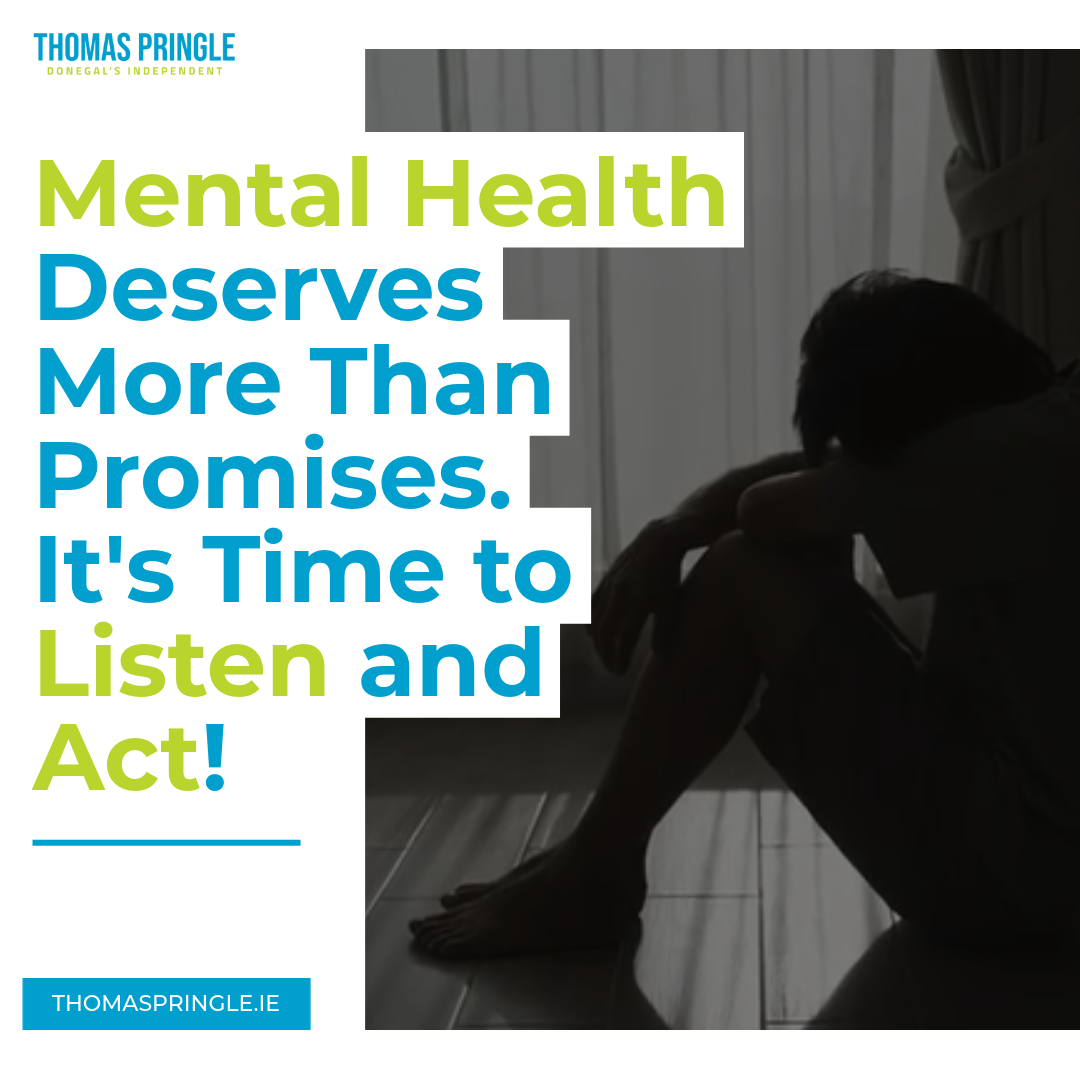- Pringle: We need a policy that recognises the importance of inshore fishing
- Pringle: Disabled people and carers face crisis of State neglect
- Pringle: Failed FF/FG housing policies forcing people to put their lives on hold
- Pringle welcomes Donegal council motion on Occupied Territories Bill: ‘We cannot stand by in the face of genocide’
Pringle calls on Government to consider recommendations of people with lived experience in mental health bill
- Updated: 20th September 2024

Independent TD for Donegal, Thomas Pringle, said new mental health legislation will make a great difference to the lives of thousands of people in Ireland, as he called on Government to consider the recommendations of NGOs and of people with lived experience when progressing the bill.
Addressing the Dáil on Thursday, Deputy Pringle said: “I would like to broadly welcome this bill. I have a few specific concerns with the legislation, but first I would like to acknowledge the fact that this is long-awaited legislation that will make an incredible difference to the lives of thousands of people in Ireland and we mustn’t delay in ensuring it passes as soon as possible.”
He thanked all involved in the legislation, particularly organisations such as Mental Health Reform. The deputy was speaking on Mental Health Bill 2024.
Deputy Pringle said: “It is so important that we invest in mental health. Research shows that just one euro spent on mental health returns €18 to the State. Yet, we continue to consistently overlook and underfund mental health in this country.
“There has been a real lack of urgency by the government to introduce this legislation and shockingly the overrun in health is bigger than our entire budget for mental health,” he said.
The deputy said: “One in two people in Ireland will experience a mental health difficulty either directly or indirectly. And yet people’s rights are treated differently when it comes to decisions around physical health treatment and decisions around mental health treatment.”
Deputy Pringle welcomed that the bill “seeks to ensure that adults’ voices must be heard and respected and that there will be a greater recognition of the will and preferences of under 18s. I also welcome that this legislation will ensure that people are supported to make their own decisions and that information must be provided to people in a way that they understand.
“It is vitally important that everyone has the opportunity to be an active participant in their own healthcare.
“I am glad to see that the legislation will expand the regulatory functions of the Mental Health Commission, that the Commission will have a register of acute mental health centres and community mental health centres, that these centres and services will now have to apply to be registered and that the Commission will now inspect community services, too,” he said.
Highlighting a section of the bill regarding specialist advisers, Deputy Pringle said: “I believe people with lived experience of mental health difficulties should be mentioned here and this would be an opportunity to have people with lived experience more involved in the Commission, which would ensure that the Commission is working in the best interests of those it supports as well.”
He also welcomed the additional criteria and safeguards for involuntary admission, saying involuntary admission “should be the very last option for treatment.”
Deputy Pringle said: “I’m sure everyone in this chamber agrees that CAHMS needs a complete overhaul and I have had constituents in Donegal tell me that they are waiting over a year on the CAMHS waiting list.
He welcomed that CAHMS will be under the remit of the Commission, “that 16 and 17-year-olds will now be able to make decisions around their mental health treatment, and that the legislation strengthens the rights of parents and guardians to information about their child’s treatment.
“I would like to see an explicit prohibition on admitting children into adult psychiatric units and a greater onus on the HSE to provide age-appropriate facilities.
“I support the recommendation by Mental Health Reform that young people should be able to access mental healthcare in the same service up to the age of 25 years,” he said.
The deputy said: “I also support the World Health Organization’s opinion that electro-convulsive therapy should not be given to a young person without their agreement and I was disappointed to see that ECT is still in this new bill.
“I would urge the government to consider the recommendations of the NGOs and of those who have lived experience when progressing this legislation. I would also urge the government to progress this legislation as soon as possible and not to make the same mistakes in this year’s budget that were made in last year’s.
“We need to ensure sufficient funding for mental health in this country is prioritised and this should be reflected in the budget in two weeks’ time,” he said.



